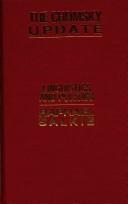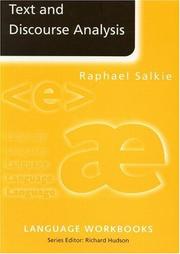| Listing 1 - 8 of 8 |
Sort by
|

ISBN: 0044455909 0044455895 9780044455899 Year: 1990 Publisher: London: Unwin Hyman,
Abstract | Keywords | Export | Availability | Bookmark
 Loading...
Loading...Choose an application
- Reference Manager
- EndNote
- RefWorks (Direct export to RefWorks)
Linguistics --- Chomsky, Noam A. --- Chomsky, Noam --- Political and social views --- Pensee politique et sociale --- Chomsky, Noam, --- #SBIB:309H514 --- #SBIB:321H60 --- Linguistiek --- Westerse politieke en sociale theorieën vanaf de 19e eeuw: socialisme, marxisme, communisme, anarchisme --- -Chomsky, Avram Noam --- Ḥomsḳi, Noʻam --- Chomski, Noham A. --- Chomusukī, N. --- Shūmskī, Nuʻūm --- Chʻiao-mu-ssu-chi --- Khomskiĭ, N. --- Khomskiĭ, Noam --- Camaskī, Noẏāma --- Chāmskī, Nuvām --- חומסקי, נועם --- تشومسكي، نعام --- تشومسكي، نعوم --- چومسكى، نعام --- ノーム・チョムスキー --- -Political and social views --- Chomsky, Noam. --- Political and social views. --- Chomsky, Abraham Noam --- Chomsky, Noam, - 1928 --- -Chomsky, Noam, - 1928- - Political and social views --- -Chomsky, Noam, - 1928 --- -Linguistics --- -Chomsky, Noam, - 1928-
Book
ISBN: 0415083982 Year: 1992 Publisher: London Routledge
Abstract | Keywords | Export | Availability | Bookmark
 Loading...
Loading...Choose an application
- Reference Manager
- EndNote
- RefWorks (Direct export to RefWorks)
Linguistics --- Chomsky, Noam A. --- Noam Chomsky --- Noam Chomsky. --- Chomsky, Noam

ISBN: 0415092787 1138168890 9786610562725 1134872038 1280562722 0203138147 113487202X 9780415092784 9780203138144 6610562725 Year: 1995 Publisher: London ; New York : Routledge,
Abstract | Keywords | Export | Availability | Bookmark
 Loading...
Loading...Choose an application
- Reference Manager
- EndNote
- RefWorks (Direct export to RefWorks)
A practical, `user-friendly' guide to the issues and methods associated with text and discourse analysis. Text and Discourse Analysis:* examines a wide variety of authentic texts including news stories, adverts, novels, official forms, instruction manuals and textbooks* contains numerous practical activities* looks at a range of cohesive devices* concludes by looking at larger patterns in texts, a set of further exercises and a guide for further reading* provides a hands-on guide to an area of growing importance in language study.
801.56 --- #KVHA:Taalkunde Engels --- Discourse analysis --- -Written communication --- -English language --- -801.56 Syntaxis. Semantiek --- Syntaxis. Semantiek --- Germanic languages --- Written discourse --- Written language --- Communication --- Language and languages --- Visual communication --- Discourse grammar --- Text grammar --- Semantics --- Semiotics --- Problems, exercises, etc --- -Problems, exercises, etc --- #KVHA:Taalkunde; Engels --- -Written discourse --- 801.56 Syntaxis. Semantiek --- English language --- Written communication --- Discourse analysis&delete& --- Didactics of languages --- Problems, exercises, etc. --- Analyse du discours --- Anglais (Langue) --- Communication écrite --- Problèmes, exercices, etc --- Discourse analysis - Problems, exercises, etc. --- Written communication - Problems, exercises, etc. --- English language - Discourse analysis - Problems, exercises, etc.
Book
ISBN: 1138997722 1134740832 1315880377 113474076X Year: 2014 Publisher: Oxon [England] : Routledge,
Abstract | Keywords | Export | Availability | Bookmark
 Loading...
Loading...Choose an application
- Reference Manager
- EndNote
- RefWorks (Direct export to RefWorks)
Noam Chomsky has been described as 'arguably the most important intellectual alive'. His revolutionary work in linguistics has aroused intense scholarly interest, while his trenchant critique of United States foreign policy and his incisive analysis of the role of intellectuals in modern society have made him a prominent public figure.Raphael Salkie's timely book introduces the two parts of Chomsky's work and explores the connections between them. He provides an accessible and up-to-date introduction to Chomsky's linguistics, laying out his basic assumptions and aims - in particular,
Language and languages --- Political aspects. --- Chomsky, Noam. --- Chomsky, Noam --- Political and social views.
Book
ISBN: 3319322451 3319322478 Year: 2017 Publisher: Cham : Springer International Publishing : Imprint: Springer,
Abstract | Keywords | Export | Availability | Bookmark
 Loading...
Loading...Choose an application
- Reference Manager
- EndNote
- RefWorks (Direct export to RefWorks)
This book explores new territory at the interface between semantics and pragmatics, reassessing a number of linguistic phenomena in the light of recent advances in pragmatic theory. It presents stimulating insights by experts in linguistics and philosophy, including Kent Bach, Philippe de Brabanter, Max Kölbel and François Recanati. The authors begin by reassessing the definition of four theoretical concepts: saturation, free pragmatic enrichment, completion and expansion. They go on to confront (sub)disciplines that have addressed similar issues but that have not necessarily been in close contact, and then turn to questions related to reported speech, modality, indirect requests and prosody. Chapters investigate lexical pragmatics and (cognitive) lexical semantics and other interactions involving experimental pragmatics, construction grammar, clinical linguistics, and the distinction between mental and linguistic content. The authors bridge the gap between different disciplines, subdisciplines and methodologies, supporting cross-fertilization of ideas and indicating the empirical studies that are needed to test current theoretical concepts and push the theory further. Readers will find overviews of the ways in which concepts are defined, empirical data with which they are illustrated and explorations of the theoretical frameworks in which concepts are couched. This exciting exchange of ideas has its origins in the editors’ workshop series on the theme ‘The semantics/pragmatics interface: linguistic, logical and philosophical perspectives’, held at the University of Lille 3 in 2012-13. Scholars of linguistics, logic and philosophy and those interested in the research benefits of crossing disciplines will find this work both accessible and thought-provoking, especially those with an interest in pragmatic theory or semantics.
Linguistics --- Logic. --- Philosophy of Language. --- Theoretical Linguistics. --- Argumentation --- Deduction (Logic) --- Deductive logic --- Dialectic (Logic) --- Logic, Deductive --- Intellect --- Philosophy --- Psychology --- Science --- Reasoning --- Thought and thinking --- Philosophy. --- Methodology --- Semantics. --- Pragmatics. --- Discourse analysis. --- Pragmalinguistics --- General semantics --- Language and languages --- Logic, Symbolic and mathematical --- Semantics (Philosophy) --- Formal semantics --- Semasiology --- Semiology (Semantics) --- Comparative linguistics --- Information theory --- Lexicology --- Meaning (Psychology) --- Discourse grammar --- Text grammar --- Semantics --- Semiotics --- Language and languages—Philosophy. --- Linguistics. --- Linguistic science --- Science of language --- Theoretical Linguistics / Grammar.
Digital
ISBN: 9783319322452 9783319322476 Year: 2017 Publisher: Cham Springer
Abstract | Keywords | Export | Availability | Bookmark
 Loading...
Loading...Choose an application
- Reference Manager
- EndNote
- RefWorks (Direct export to RefWorks)
This book explores new territory at the interface between semantics and pragmatics, reassessing a number of linguistic phenomena in the light of recent advances in pragmatic theory. It presents stimulating insights by experts in linguistics and philosophy, including Kent Bach, Philippe de Brabanter, Max Kölbel and François Recanati. The authors begin by reassessing the definition of four theoretical concepts: saturation, free pragmatic enrichment, completion and expansion. They go on to confront (sub)disciplines that have addressed similar issues but that have not necessarily been in close contact, and then turn to questions related to reported speech, modality, indirect requests and prosody. Chapters investigate lexical pragmatics and (cognitive) lexical semantics and other interactions involving experimental pragmatics, construction grammar, clinical linguistics, and the distinction between mental and linguistic content. The authors bridge the gap between different disciplines, subdisciplines and methodologies, supporting cross-fertilization of ideas and indicating the empirical studies that are needed to test current theoretical concepts and push the theory further. Readers will find overviews of the ways in which concepts are defined, empirical data with which they are illustrated and explorations of the theoretical frameworks in which concepts are couched. This exciting exchange of ideas has its origins in the editors’ workshop series on the theme ‘The semantics/pragmatics interface: linguistic, logical and philosophical perspectives’, held at the University of Lille 3 in 2012-13. Scholars of linguistics, logic and philosophy and those interested in the research benefits of crossing disciplines will find this work both accessible and thought-provoking, especially those with an interest in pragmatic theory or semantics.
Book
ISBN: 9783110196344 3110196344 9786612296512 1282296515 3110213338 9783110213331 9781282296510 6612296518 Year: 2009 Publisher: Berlin ; New York : Mouton de Gruyter,
Abstract | Keywords | Export | Availability | Bookmark
 Loading...
Loading...Choose an application
- Reference Manager
- EndNote
- RefWorks (Direct export to RefWorks)
This volume presents two kinds of studies on English modality. On the one hand, there are strongly empirical, corpus-based studies of individual uses of English modal auxiliaries and modal constructions, such as may in interrogatives, might in concessive clauses, shall and may vs must in legal English, the use of surprised if and surprising if constructions, the use and history of adhortative constructions, or the modal-aspectual use of come to in I came to realize that X. The book also contains work that presents new views on some of the classical issues, like the relations between modality and time, modality and commitment, modals and (inter)subjectivity. A special place is given to work that approaches the English modals from the perspective of the 'Theory of Enunciative Operations' developed by the French linguist Antoine Culioli and his colleagues. Thus the book provides new perspectives and answers on basic questions about modality, in general, and its expression in English, in particular.
English language --- Modality (Linguistics). --- Modality. --- Modality (Linguistics) --- Grammar --- 802.0-56 --- 802.0-56 Engels: syntaxis; semantiek --- Engels: syntaxis; semantiek --- Linguistics --- Modality --- Germanic languages --- English (language). --- modality (linguistics).
Digital

ISBN: 9783110213331 9783110196344 Year: 2009 Publisher: Berlin ;; Boston De Gruyter Mouton
Abstract | Keywords | Export | Availability | Bookmark
 Loading...
Loading...Choose an application
- Reference Manager
- EndNote
- RefWorks (Direct export to RefWorks)
| Listing 1 - 8 of 8 |
Sort by
|

 Search
Search Feedback
Feedback About UniCat
About UniCat  Help
Help News
News